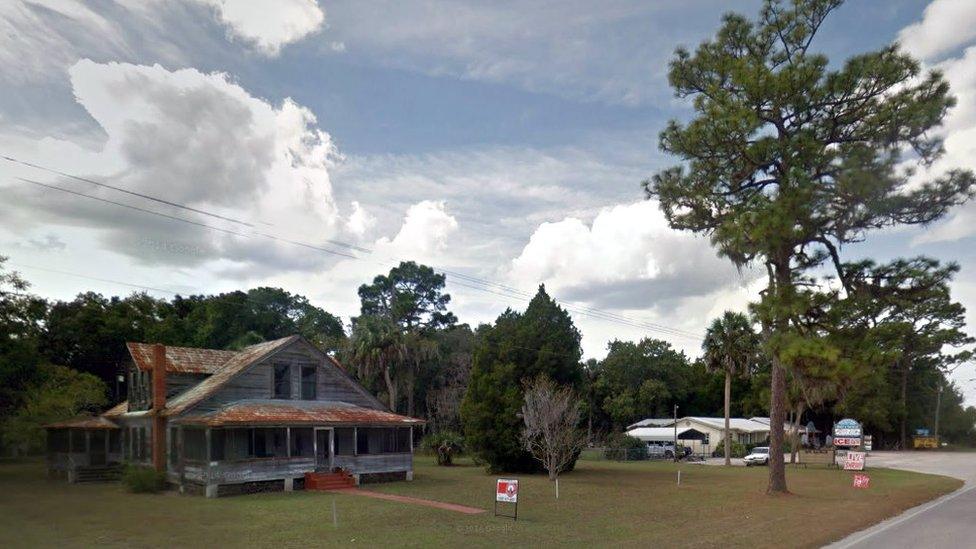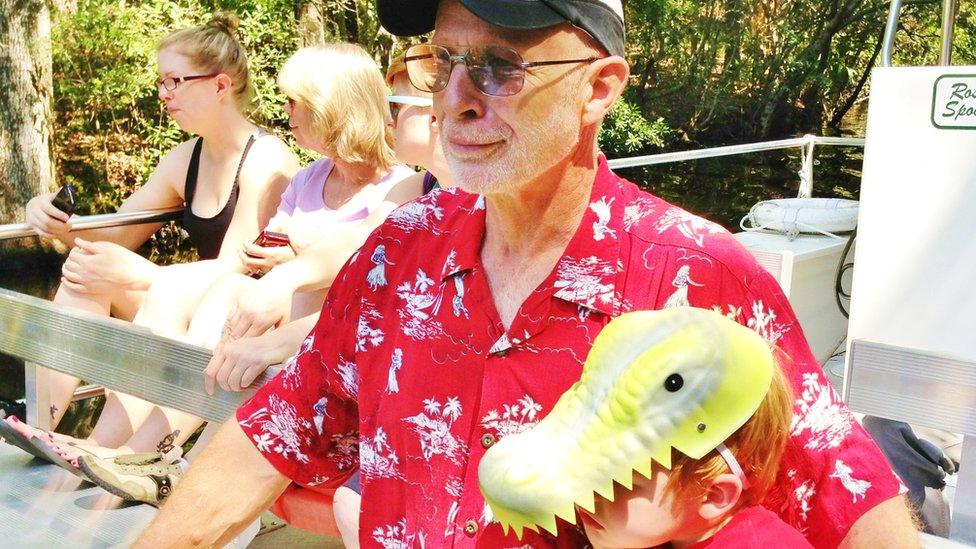Why do some mass shootings make the news and some don't?
- Published

The home where four people were shot on 1 October
Last week, a gunman killed nine people at a community college in Oregon. Several hours later, another man shot three in Florida. Only one made international news.
Walter "Buzz" Terhune was a Vietnam veteran who moved to Florida to care for his elderly parents. He loved kids, helping other veterans and participating in civic life in tiny Inglis, a commercial fishing town near Florida's west coast.
Terhune didn't know Otis Ray Bean, but that didn't stop the 68-year-old from coming to Bean's aid when he was shot across the street from where Terhune was getting cash at a bank.
The shooter then turned his weapon on Terhune, then his estranged wife, then himself.
"It was so like him to go to save somebody else," says Lea Terhune, Walter's sister. "Buzz would not run the other way."
Walter Terhune stumbled into what would turn out to be one of two mass killings in the US on 1 October. The first occurred several hours earlier, 3,000 miles away in Roseburg, Oregon, when a 26-year-old man opened fire inside a classroom at Umpqua Community College. He wounded dozens and killed at least nine people before he shot himself.
The BBC contrasts President Obama's reactions after mass shootings, with the levels of US gun ownership during his terms in office. (Video by David Botti)
Like many other Americans, Wendy Harvey was following the news from her home in Steamboat Spring, Colorado, when she got a call from a relative saying her uncle Buzzy had also been involved in a shooting. She was at home with her son at the time.
"It's a hard conversation to tell your six-year-old that his favourite uncle just got shot and killed," she says. "Oregon is going on and all of a sudden you hear from Florida that it's your uncle. It can happen to anyone."
Both incidents would be classified as "active shooter" incidents - defined as "an individual actively engaged in killing or attempting to kill people" - and also could both be considered "mass killings", defined by one federal statute as three or more people killed.
But Oregon has overshadowed what happened in Inglis, with no national media attention devoted to the latter. It is in part a matter of timing - Oregon happened first - and a matter of numbers. The Oregon shooting had more than three times as many casualties.
Still, says Harvey, this paints a disturbing portrait of gun violence in the US today.
"It's become such the norm," she says. "That's a sad state of affairs if someone kills three people and it's just not that big of a deal."

Walter Terhune with his nephew Griffin Harvey
According to local news reports, external in Florida, 57-year-old Walter Tyson went to the unpainted wooden house across from Inglis's city hall to confront his estranged wife Patricia and her new boyfriend, Bean. Tyson was armed. Witnesses said Terhune had tried to stop Tyson by telling him he was shooting close to a park where children were playing.
"He talks to vets a lot that have PTSD and all these things. He feels like he can talk to them and relate to them," says Harvey. "I'm sure in his head he thought he could talk to this person."
According to the FBI, the number of "active shooter" incidents rose, external in frequency between 2000 and 2013. It reported that there were an average of 16.4 active shooter events each year between 2007 to 2013, compared to an average of 6.4 incidents from 2000 to 2006.
While there is no universally accepted definition of a "mass shooting", using the federal statute that defines it as three or more killed shows that they are also on the rise, external. (Other measures of incidents of mass violence exclude ones that began as a domestic dispute, or ones where the victims knew one another.)
There have been more "mass shootings" than days of the year so far, external in 2015.
Including Terhune and the Tysons, three people died in Inglis on Thursday. Bean was taken to a hospital, but according to his sister, Nadene Bean Freeman, he is brain dead and is only on life support so that his organs may be harvested.
She said her brother was recovering from his own personal tragedy - his only son Jared was killed in a car crash as a young boy, then his wife died of cancer.
"He's at peace now," she wrote in a message to the BBC.
While the circumstances might have been different, Terhune's family feels they are going through something similar to the nine families in Roseburg.
"Mass murder is still one family by one family by one family," says his sister Lea. "He came home from war a damaged person...in his death he became the hero that in his heart he always was."